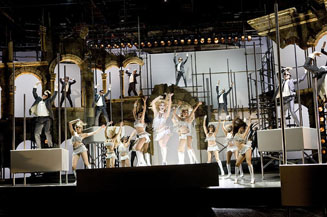Movie Review: Nine
By Matthew Huntley
January 11, 2010
BoxOfficeProphets.com

Film buffs will recognize the parallels between Rob Marshall's Nine and Federico Fellini's autobiographical 8 1/2, and indeed Fellini's film inspired the 1982 musical called Nine, from which Marshall's film is adapted. It's when Nine is a musical that it's at its best, because whenever Maury Yeston's music and lyrics are performed, it comes alive. The song and dance numbers lend the film its energy and vitality, which is good since the story is flat compared to Fellini's classic. It goes to show only autobiographers can tell their own stories.
It's hard to imagine, but Daniel Day-Lewis isn't particularly striking or memorable as Guido Contini, an Italian film director with eight pictures to his name, the best being from his early work (a reporter reminds Guido that artists always produce their best work before they're famous). Guido admits his latter films are flops, as do his fans, but some still view them as a guilty pleasure. With his ninth film, Guido suffers from writer's block and can't generate a script for his upcoming shoot, which is supposed to commence in ten days. Naturally, Guido and his producer, Dante (Ricky Tognazzi) are starting to panic.
Incidentally, or perhaps not incidentally, this comes at a time when Guido must evaluate the women in his life. His wife, Luisa (Marion Cotillard), wants to believe she's still something special to him, but she's aware of his mistress, Carla (Penelope Cruz). He must also fight to keep his leading actress, Claudia (Nicole Kidman), who's threatening to leave the project without a finished script. A new temptation comes in the form of Stephanie (Kate Hudson), an American fashion journalist; and Guido always remembers the prostitute from his childhood, Saraghina (Fergie), who first instigated his desire for womanizing.
Ultimately, Guido's behavior boils down to his wanting to appease his late and beloved mother, (Sophia Loren), while his best friend and costume designer, Lilli (Judi Dench), talks to him sternly without expressing sympathy.
If the movie had been about all the women and not Guido, it might have really amounted to something, but it makes Guido the focal point, and he's written rather lackluster and we don't really care if he finishes the script or finds the path to salvation. I wanted to spend more time with the colorful women, each of whom has her own song and dance number. Cotillard is especially strong as Luisa, but she gives an ironic smile at the end that didn't seem convincing given the context of the situation.
Marshall certainly has a gift for musicals (Chicago), but I'm not sure this particular musical needed to be adapted into a feature. It's more or less a remake of 8 1/2, which nobody was begging to be re-imagined by another director. On a technical level, Nine is well made, with some vivacious song and choreography, and the female performances are all strong in their own right. But after we leave the theater, the movie doesn't leave an imprint on our hearts or minds and we question whether it really served a purpose.